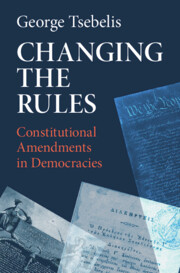Appendix 6.A.3
This appendix presents two different tables, one of which runs the cultural variables all together and the other one at a time along with the constitutional rigidity (the 57 countries are the intersection of the 103 countries in this book with the countries in the Blake et al. [Reference Blake, Cozza, Armstrong and Friesen2023] article). This is the simplest appropriate empirical test, which confirms the conclusions of Chapter 3 for the more empirically minded reader. Actually, Chapter 3 argued that the cultural variables to be included required justification at the theoretical level, while here it becomes clear that even the empirical accuracy is questionable.
Table 6.A.3.1 OLS regressions of different amendment rates (POLITY2 ≥ 5 cutoff) on constitutional rigidity and social capital (n = 57)
| Fundamental amendments | Significant and fundamental | All amendments | |
|---|---|---|---|
| n | 57 | 57 | 57 |
| (Intercept) | 0.127 *** | 0.288 *** | 0.388 ** |
| (0.028) | (0.077) | (0.136) | |
| Constitutional rigidity | –0.067 * (0.026) | –0.158 * (0.07) | –0.295 * (0.123) |
| Political trust | 0.007 | 0.015 | 0.023 |
| (0.008) | (0.022) | (0.038) | |
| Group membership | –0.01 | –0.031 | 0.002 |
| (0.01) | (0.026) | (0.047) | |
| Civic activism | –0.021 | 0.037 | 0.314 ** |
| (0.021) | (0.062) | (0.109) | |
| R2 | 0.171 | 0.111 | 0.211 |
| Adj. R2 | 0.107 | 0.043 | 0.15 |
*** p < 0.001; ** p < 0.01; * p < 0.05.
Table 6.A.3.2 OLS regressions of different amendment rates (POLITY2 ≥ 5 cutoff) on constitutional rigidity and each indicator of social capital separately (n = 57)
| Fundamental amendments | Fundamental and significant | All amendments | Fundamental amendments | Fundamental and significant | All amendments | Fundamental amendments | Fundamental and significant | All amendments | |
|---|---|---|---|---|---|---|---|---|---|
| n | 57 | 57 | 57 | 57 | 57 | 57 | 57 | 57 | 57 |
| (Intercept) | 0.103 *** | 0.255 *** | 0.510 *** | 0.119 *** | 0.288 *** | 0.443 ** | 0.114 *** | 0.248 *** | 0.390 ** |
| (0.024) | (0.064) | (0.121) | (0.027) | (0.074) | (0.140) | (0.025) | (0.068) | (0.119) | |
| Constitutional rigidity | –0.071 ** | –0.152 * | –0.242 | –0.071 ** | –0.153 * | –0.244 | –0.067 * | –0.156 * | –0.299 * |
| (0.025) | (0.069) | (0.129) | (0.025) | (0.068) | (0.129) | (0.025) | (0.069) | (0.121) | |
| Political trust | 0.003 | 0.007 | 0.035 | ||||||
| (0.008) | (0.020) | (0.038) | |||||||
| Group membership | –0.010 | –0.021 | 0.045 | ||||||
| (0.009) | (0.024) | (0.045) | |||||||
| Civic activism | –0.026 | 0.021 | 0.322 ** | ||||||
| (0.022) | (0.059) | (0.104) | |||||||
| R2 | 0.128 | 0.086 | 0.076 | 0.146 | 0.097 | 0.079 | 0.149 | 0.086 | 0.204 |
| Adj. R2 | 0.096 | 0.052 | 0.042 | 0.115 | 0.063 | 0.045 | 0.118 | 0.052 | 0.174 |
*** p < 0.001; ** p < 0.01; * p < 0.05.
Data on the indicators of social capital are taken from Blake et al. (Reference Blake, Cozza, Armstrong and Friesen2023), which results in fifty-seven observations as in their cross-national analyses. While rigidity is significantly negatively associated with all kinds of amendments, among the social capital indicators only civic activism is significantly (and positively) associated only when looking at all amendments.
When considering each indicator of social capital separately, the result is the same as in Table 6.A.2.1: Only constitutional rigidity is significantly associated with amendment rates. Civic activism is the only social capital indicator that exhibits a significant relationship with one of the amendment-rate measures.

